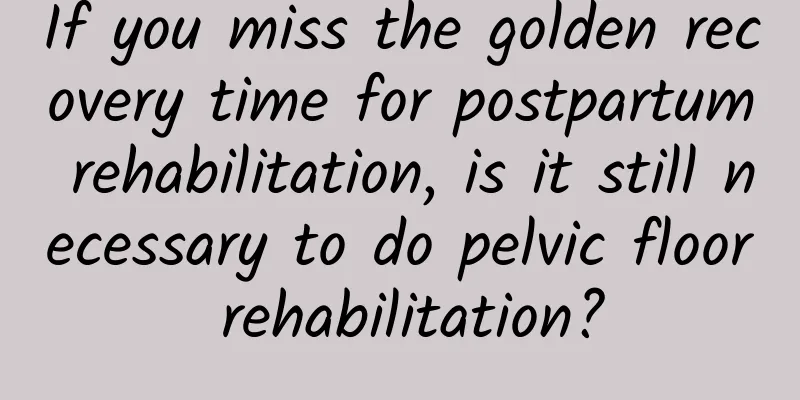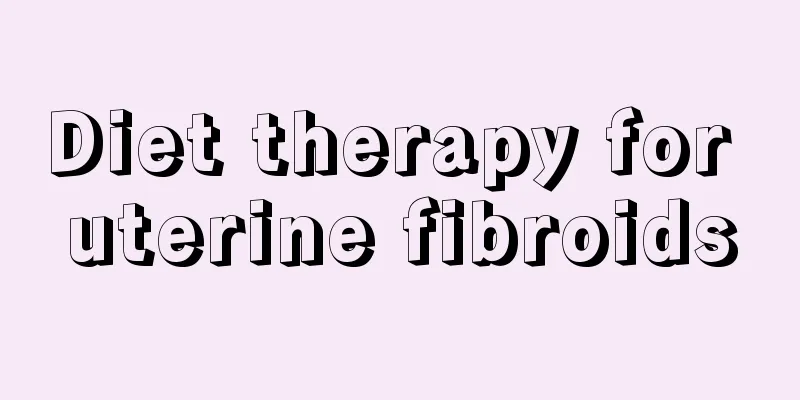If you miss the golden recovery time for postpartum rehabilitation, is it still necessary to do pelvic floor rehabilitation?

|
I happened to meet an auntie who was dancing in the square. She was complaining to her daughter that she often leaked urine while dancing, and several other aunties around her were also in the same situation. So the aunt was very depressed, thinking that it was because of her old age and that her health problems were caused by her old age, and she couldn't help but accept her age. In fact, there are many people like the old lady. You can also find that those who do pelvic floor rehabilitation are new mothers after childbirth, and middle-aged and elderly women are rarely seen. Does this mean that middle-aged and elderly women do not have pelvic floor problems? Obviously not. In fact, the pelvic floor problems of this group of people are the most serious and need intervention urgently. Some of them have problems left over from not receiving timely rehabilitation after childbirth. Because the problem area is relatively private, I just endured it and had to wear diapers for a long time. Another part is concentrated in postmenopausal women. In addition to the damage to the pelvic floor caused by childbirth, aging and estrogen reduction are also causes of pelvic floor dysfunction. Our bladder will also age, and the aging bladder causes the bladder neck and proximal urethra to move downward, and the urethra becomes relaxed and shortened. Estrogen is an important factor in maintaining the tension and elasticity of the pelvic floor tissue. When estrogen levels drop, the pelvic floor muscle tension will also drop, and the supporting capacity for the pelvic organs will also drop, resulting in symptoms such as stress urinary incontinence, uterine prolapse, and pelvic pain. Although with the development of the Internet, a lot of medical knowledge has been widely and quickly disseminated, and the importance of postpartum recovery is known to many people. However, there are many people who missed the best time for postpartum recovery due to economic and time reasons, or our mothers or grandmothers never received postpartum rehabilitation due to the limited medical knowledge and conditions at the time, and suffered from long-term urinary incontinence. The best time for postpartum recovery is 42 days to 6 months after delivery, so many people have questions: If I do not undergo timely rehabilitation within 3 months after giving birth or have been a mother for many years, is it still necessary to undergo rehabilitation? What will be the effect of rehabilitation? Before explaining this problem, we understand what the golden period is: ● Golden period: The golden period of any treatment means that the recovery quality and speed of interventional treatment at this stage are the best compared to any other time, because at this time the pelvic floor function has only been detected to have problems, and has not yet been accompanied by frequent urinary incontinence and severe prolapse. In addition, the body's own nerves and cell repair are at a peak. However, this does not mean that interventional treatments at other stages are ineffective, but the recovery speed may be relatively affected. Once again, it is recommended that if conditions permit, you should spend time and energy to start postpartum recovery as soon as possible. If you really miss the golden period of postpartum recovery, or if you are a mother in her 40s or 50s, or even a grandmother in her 50s or 60s: If you still have symptoms of pelvic floor dysfunction such as coughing, urine leakage, pelvic pain, and a feeling of lower abdominal sinking, please do not be afraid to seek medical treatment. As long as rehabilitation is involved, there is a possibility of recovery. It is unlikely that the pelvic floor muscle function will return to normal by self-healing. Professional pelvic floor rehabilitation training is still required. Therefore, pelvic floor rehabilitation is not limited to the 6 months after delivery. Anyone with pelvic floor muscle dysfunction needs pelvic floor rehabilitation. Author: Guo Yisha, Bi Xia, Zhao Jiangxia About the Author Bi Xia Bi Xia, Doctor of Medicine, Chief Physician, Master Supervisor, is currently the Director of the Department of Rehabilitation Medicine, Zhoupu Hospital Affiliated to Shanghai University of Medicine and Medical Sciences, and the Vice President of the School of Rehabilitation, Shanghai University of Medicine and Medical Sciences. In 2010, 2018 and 2019, she was selected into the Excellent Discipline Leader and Leading Talent Training Program of the Health System of Pudong New Area. She has published 4 SCI papers and more than 30 core journal papers as the first author and corresponding author. Professional fields: stroke rehabilitation, fracture postoperative rehabilitation, spinal cord injury rehabilitation, artificial joint perioperative rehabilitation, hand injury rehabilitation, etc. Main academic positions: Member of the Geriatric Rehabilitation Branch of the Chinese Rehabilitation Medicine Association, Member of the Medical and Nursing Integration Committee of the Chinese Rehabilitation Medicine Association, Rehabilitation Committee Member of the Geriatric Rehabilitation Branch of the Chinese Medical Doctor Association, Executive Director of the Shanghai Rehabilitation Medicine Association, Member of the Physical Medicine and Rehabilitation Branch of the Shanghai Medical Association, Vice Chairman of the Rehabilitation Treatment Committee of the Shanghai Rehabilitation Medicine Association, Member of the Orthopedic Rehabilitation Committee of the Shanghai Rehabilitation Medicine Association, Member of the Spinal Cord Injury Rehabilitation Committee of the Shanghai Rehabilitation Medicine Association, Member of the Community Rehabilitation Committee of the Shanghai Rehabilitation Medicine Association, Member of the Sports Health and Rehabilitation Committee of the Shanghai Rehabilitation Medicine Association, Chairman of the Rehabilitation and Physiotherapy Committee of the Shanghai Pudong New Area Medical Association, and other academic positions. Funded by Shanghai Science and Technology Commission's Science Popularization Project (Project No.: 20DZ2311100) |
<<: How much do you know about the prostate?
>>: HPV vaccine is free in Jiangsu! Here are some things you need to know about HPV
Recommend
Does the bedroom gray wood board match the off-white wall? What wall matches the bedroom gray wood board?
We all know that the bedroom is an important plac...
What effects does IUD insertion have on the body?
We all know that condoms are the preferred method...
Four Seasons Pharmacist says: Stay away from "air-conditioning disease" and use "medicine" to maintain health
In the hot summer, air conditioners keep us away ...
What should girls do if they have acne?
Most people will get acne when they reach puberty...
Cervical cauliflower growth
The cervix of women is most prone to inflammation...
Be careful! 80% of people are diagnosed with gastric cancer at an advanced stage. Are you one of them?
Gastric cancer is the third most common cancer in...
What should I do if a girl snores?
We may see people snoring in daily life, mostly m...
What is the cause of labia ulceration?
The thing that women fear most is suffering from ...
Is it normal to have brown discharge after an abortion?
Abortion is a relatively popular technology in mo...
Are “sugar-free” drinks necessarily healthier?
As living standards improve, people’s pursuit of ...
What are the hazards of high blood lipids? What should you pay attention to when you have high blood lipids?
As our living standards improve, our health statu...
What should I do if I can’t get pregnant?
In life, the inability to conceive is related to ...
Why does the Epiphyllum wither so quickly? How can we plant Epiphyllum so that it blooms more?
There is an idiom called "a flash in the pan...
Can I have a gynecological examination during my period?
Most women go to the hospital for check-ups, beca...









